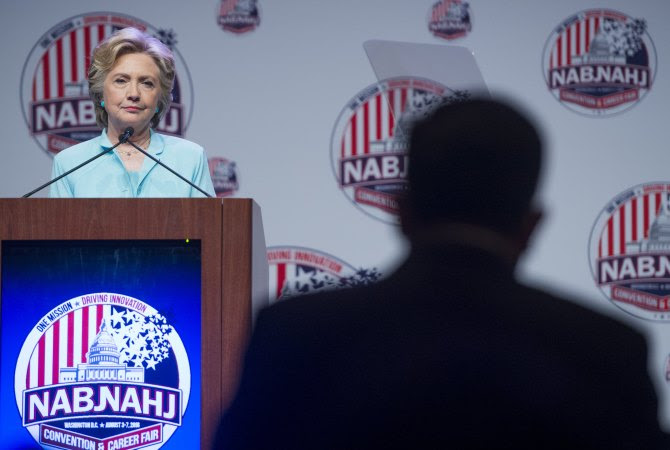By: Jason Johnson

There are a few people that I would wait an entire day to see on stage. Chris Rock if he was doing a live set with new material. Zadie Smith reading from one of her most recent works. I would even consider getting up early to get tickets to see Michelle Obama, since I haven’t heard her in person too many times. However, on Friday in order to see Democratic nominee Hillary Clinton speak to the joint conference of the National Association of Black Journalists and National Association of Hispanic Journalists, it was an almost six hour security process for someone who has never been known to put on much of a “show.”
Speaking to the largest gathering of minority journalists in the United States, Clinton had the opportunity to influence the next 90 days of stories, op-eds and think pieces. At the same time, the NABJ/NAHJ had the crucial opportunity to ask some tough probing questions of Clinton who has avoided a lot of tough questions from people of color as Trump sucks up most of the press attention. Did either side accomplish its goal? In the end I believe both the NABJ/NAHJ conference and Clinton weren’t up to the challenge.
Every four years or so the NABJ and NAHJ have a joint conference where prominent and up-and-coming journalists of color get together to network, vent and mentor each other into success. When these joint meetings occur during an election year usually one or both of the major party nominees shows up. When I attended my first “UNITY” conference in 2008 in Chicago, then Senator Barack Obama showed up, wowed the crowd and answered a few tough questions before going back on the campaign trail.
This year, Hillary Clinton accepted the invitation to speak to the joint conference in Washington, D.C., while Donald Trump declined. For Clinton, this was a great opportunity to speak to black and Hispanic journalists, who have the ears and minds of the two constituencies she has to turn out to vote in order to win this fall. She’s been riding high after the DNC convention, while Donald Trump has set himself on fire nearly everyday. A good speech and Q&A with this crowd could’ve essentially run up the score to what is already an inordinately high post-convention bounce. However, Hillary decided to mail it in, rather than drop a dope speech to step to.
She thanked the audience for their hard work, noted that the NABJ had been founded in the Marriott Wardman Hotel over 30 years ago and proceeded to give a speech about economic empowerment. It was boilerplate, and certainly not the best pitch to her audience. What about talking about the crucial role the black and Latino press play in getting out voters? Informing voters? Holding Democrats (and Republicans) accountable? Highlighting issues that would otherwise go unreported? There were half a dozen ways she could have addressed the audience and the work that they do. Instead she rattled off a passionless speech even Trump could have delivered. Unfortunately the collective work of the conference wasn’t significantly better.
Logistically, the day was a bit of a mess. Initially Clinton was supposed to speak at 3 p.m., then it was 11 a.m., then it was 12 p.m. Ultimately, she really didn’t get on stage until around 1 in the afternoon. Conference attendees got two different sets of invitations to the event, sometimes with conflicting times and tickets, in addition to the event moving from over-booked to under-booked several times.
The significance of this is that while initially NABJ/NAHJ members thought there would be a full Q&A with Clinton or that she would be answering questions submitted by Twitter, none of those things happened. The Democratic nominee for president answered about four questions, all of which were asked by NABJ/NAHJ panelists while the rest of the 600 person audience didn’t get to do anything. What’s worse, the first series of questions Clinton was asked were about her ongoing email scandal, something that I doubt falls into the top five, 10 or even 30 most important issues to Latino or African-American voters.
No one asked why the Clinton campaign spends so little money advertising in black and Latino news outlets. No one asked how Hillary Clinton’s own criminal justice history is at odds with her recent stances on Black Lives Matter. No one asked how Clinton’s policies in South and Central America have led to the immigration crisis on the American border. While questions about Trump’s bigotry and Clinton’s relationships with black women were interesting, the fact that there wasn’t more of an opportunity for tough questions was a significant. Hillary won’t be subject to this kind of press corps again, and peppering her with anything other than hard-hitting, multi-layered questions was a blown chance. Then again, she blew her chance to win over the audience with a well-targeted speech to begin with.
There are worse things than a politician phoning in a speech, and there are bigger journalistic crimes than conference attendees not getting a chance to hit a candidate with real meaty questions. However in an election campaign year where African-American and Latino voters are essentially deciding between Hillary Clinton’s questionable policy past and not voting (since Trump’s Latino and black numbers are non-existent), it would help if both sides took their jobs a bit more seriously.
Clinton should certainly not be taking the minority press for granted. And more importantly, the minority press shouldn’t abdicate their responsibility to be the voice of the most crucial voters in the fall’s election.
Jason Johnson, political editor at The Root, is a professor of political science at Hiram College in Ohio and an analyst for CNN, MSNBC, Al-Jazeera and Fox Business News. Follow him on Twitter.
Like The Root on Facebook. Follow us on Twitter.














